| Zamelis Synagogue | |
|---|---|
 Lower part of the abandoned synagogue | |
| Religion | |
| Affiliation | Judaism |
| Status | Not in use |
| Location | |
| Location | |
| Materials | Bricks |
The Zamelis Synagogue (Lithuanian : Zamelio sinagoga) is a former synagogue in Vilnius, Lithuania. [1]
| Zamelis Synagogue | |
|---|---|
 Lower part of the abandoned synagogue | |
| Religion | |
| Affiliation | Judaism |
| Status | Not in use |
| Location | |
| Location | |
| Materials | Bricks |
The Zamelis Synagogue (Lithuanian : Zamelio sinagoga) is a former synagogue in Vilnius, Lithuania. [1]
The Synagogue was built at the beginning of the 19th century, between 1817 and 1833. It was actively used until 1940. [2] After World War II it was used as a warehouse and apartment complex. At the end of the 20th century, the building was abandoned.
In 2015 the reconstruction works in the abandoned synagogue started. [2] [3] [4]
Currently the building is not used for religious activities, but hosts various cultural events. [5]
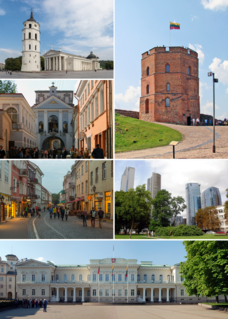
Vilnius is the capital and largest city of Lithuania, with a population of 588,412 as of 2021. The population of Vilnius's functional urban area, which stretches beyond the city limits, is estimated at 706,832, while according to the Vilnius territorial health insurance fund, there were 732,421 permanent inhabitants as of October 2020 in Vilnius city and Vilnius district municipalities combined. Vilnius is in southeastern Lithuania and is the second-largest city in the Baltic states. It is the seat of Lithuania's national government and the Vilnius District Municipality.

Vilnius Airport is the international airport of Vilnius, the capital of Lithuania. It is located 5.9 km (3.7 mi) south of the city. It is the largest of the three commercial airports in Lithuania by passenger traffic. With one runway and 5 million passengers a year. Vilnius International Airport serves as a base for airBaltic, Ryanair, and Wizz Air. The airport is managed by state-owned enterprise Lithuanian Airports under the Ministry of Transport and Communications.

The Palace of the Grand Dukes of Lithuania is a palace in Vilnius, Lithuania. It was originally constructed in the 15th century for the rulers of the Grand Duchy of Lithuania and the future Kings of Poland. The palace, located in the lower castle of Vilnius, evolved over the years and prospered during the 16th and mid-17th centuries. For four centuries the palace was the political, administrative and cultural centre of the Polish–Lithuanian Commonwealth. It was demolished in 1801. Work on a new palace started in 2002 on the site of the original building and it took 16 years to complete it in 2018. The palace was rebuilt in Renaissance style to match the Cathedral of Vilnius and, according to the testimony of one of the couriers of Grand Duchess Bona Sforza, such initial reconstruction from 1520 to 1530 cost 100,000 gold ducats and was ordered by Grand Duke Sigismund I the Old. It is believed that the reconstruction was made for the proclamation ceremonies of Sigismund II Augustus, the only son of Sigismund I the Old, as the Grand Duke of Lithuania.

The Vilnius Castle Complex is a group of cultural, and historic structures on the left bank of the Neris River, near its confluence with the Vilnia River, in Vilnius, Lithuania. The buildings, which evolved between the 10th and 18th centuries, were one of Lithuania's major defensive structures.
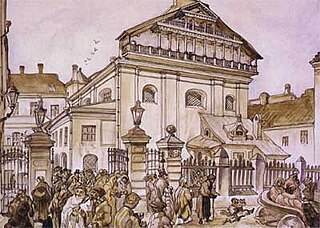
The Great Synagogue of Vilna, which once stood at the end of Jewish Street (I-2), Vilnius, Lithuania, was built between 1630 and 1633 after permission was granted to construct a synagogue from stone. Standing on the spot of an existing synagogue built in 1572, the site had first been used to house a Jewish house of prayer in 1440. Damaged in World War II, it was demolished in 1955–1957 and replaced by a kindergarten and a primary school.
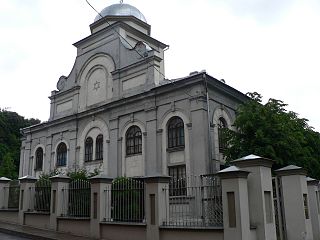
Kaunas Synagogue is one of two operating choral synagogues in Lithuania. It is located in Centras eldership, Kaunas. The Neo-Baroque synagogue was built in 1872. In 1902, before the Holocaust in Lithuania, it was one of over 25 synagogues and Jewish prayer houses in the city. The radically designed synagogue claims to have one of the most beautiful arks in the entire Jewish world.
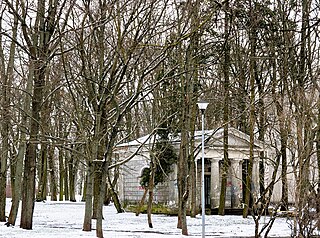
The Protestant Cemetery in Vilnius, Lithuania, was established in the early 19th century. As the city grew, there was a need to move the old Lutheran cemetery outside the city walls. The old cemetery, used from 1550s, was located on land donated by the Radziwiłł family on Liejyklos Street. Before the old cemetery was closed a professor of Vilnius University made an inventory of interesting tombstones. The list was acquired by Eustachy Tyszkiewicz and was stored in the Museum of Antiquities that he founded.
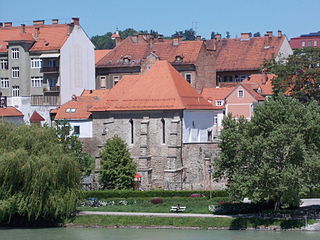
Maribor Synagogue is a former synagogue and current museum in the city of Maribor, Slovenia. Located in what was the center of the medieval Maribor ghetto Židovska ulica, it is one of the oldest preserved synagogues in Europe, and one of only two left in Slovenia; the other being the Lendava Synagogue. It once functioned as the centre of the medieval Jewish community in Maribor, among the most prominent in the Eastern Alps-area.
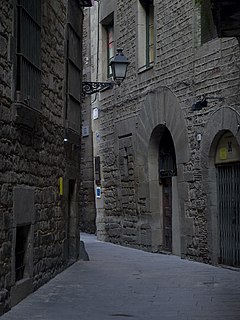
The Ancient Synagogue of Barcelona is believed to be an ancient synagogue located in the centre of Barcelona, Catalonia, Spain. It has been described as one of the oldest synagogues in Europe. After many centuries of use for other purposes, the building re-opened as a synagogue and museum in 2002. No congregation prays regularly at the Sinagoga Major, but it is used for festive occasions.

The Vilnius trolleybus system is the one of two existing trolleybus systems in Lithuania. It operates in the capital city of Vilnius, the municipal operator company is Vilniaus viešasis transportas Ltd. 188 trolleybuses are working on working-days, 106 - on weekends.

The Choral Synagogue of Vilnius is the only synagogue in Vilnius that is still in use. The other synagogues were destroyed partly during World War II, when Lithuania was occupied by Nazi Germany, and partly by the Soviet authorities after the war.
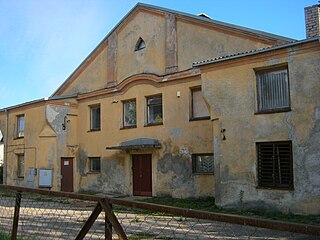
The Beit Medrash Hagadol Synagogue of Jonava, also known as White Synagogue of Jonava, is a former synagogue in Jonava.

Rokas Giedraitis is a Lithuanian professional basketball player for Baskonia of the Liga ACB and the EuroLeague. He plays at the shooting guard and small forward positions.
Vilnius Intermodal Terminal is a first railway dry port in Vilnius, Lithuania. Terminal is located next to the Vaidotai railway station. The project was carried out by Lithuanian Railways, making use of support from the EU Cohesion Fund. This project worked to achieve one of the most important goals of the EU and Lithuania: to reduce roadway usage and transfer a large part of the burden of cargo transportation to railways.
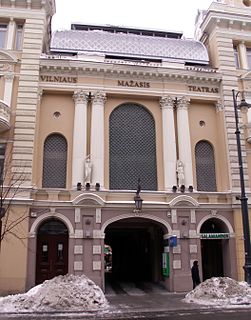
Rūta Society was a Lithuanian cultural society in Vilnius, then part of the Russian Empire, active from 1909 to the outbreak of World War I in 1914. It organized various events, including lectures, literary evenings, and musical performances, but it is most noted for its contribution to the development of the Lithuanian theater. In total, Rūta staged about 50 plays.

The Church of Jesus the Redeemer is a Roman Catholic church in the eldership of Antakalnis in Vilnius, Lithuania. It was founded by the Hetman of the Grand Duchy of Lithuania and Voivode of Vilnius Jan Kazimierz Sapieha the Younger and the Trinitarians in 1694. Its architect is Giovanni Pietro Perti, who is also the author of the nearby Church of St. Peter and St. Paul. The church, Trinitarians Monastery and the Sapieha Palace with its park formed a magnificent Baroque ensemble.

The Synagogue of Alanta is a former synagogue in Alanta, Molėtai District Municipality, Lithuania.

The Synagogue of Čekiškė is a former synagogue in Čekiškė, Kaunas District Municipality, Lithuania.

Vokiečių Street is a street in the Old Town of Vilnius, the capital of Lithuania. It is one of the oldest streets in Vilnius and its name arise from the 14th century when the German merchants and craftsman settled there. From 1546, the Vilnius Mint was located in the street. The street was the most beautiful in Vilnius in the 16th century as it already had many brick houses. In the second half of the 19th century, the street was densely inhabited by the Jews and the Great Synagogue of Vilna was located in Vokiečių Street 13A.
Coordinates: 54°40′26″N25°17′02″E / 54.674012°N 25.2838973°E